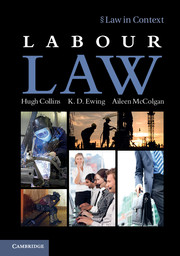Book contents
- Frontmatter
- Contents
- Preface
- Acknowledgments
- Table of cases
- Table of statutes
- Table of statutory instruments
- Table of European Union instruments
- Table of ILO instruments
- Table of other international instruments
- Abbreviations
- Part I Introduction
- Part II The contract of employment
- 3 Terms of the contract of employment
- 4 Authority and co-operation
- 5 Flexibility and precarious work
- 6 The personal scope of labour law
- Part III Statutory regulation of the employment relationship
- Part IV Collective labour rights
- Part V Termination of employment
- Index
- References
3 - Terms of the contract of employment
from Part II - The contract of employment
- Frontmatter
- Contents
- Preface
- Acknowledgments
- Table of cases
- Table of statutes
- Table of statutory instruments
- Table of European Union instruments
- Table of ILO instruments
- Table of other international instruments
- Abbreviations
- Part I Introduction
- Part II The contract of employment
- 3 Terms of the contract of employment
- 4 Authority and co-operation
- 5 Flexibility and precarious work
- 6 The personal scope of labour law
- Part III Statutory regulation of the employment relationship
- Part IV Collective labour rights
- Part V Termination of employment
- Index
- References
Summary
The contract of service
People work under many different institutional arrangements. In the past, slavery, forced labour, household servants and feudal serfdom have been significant institutional arrangements for work, each with its distinctive legal framework. During the nineteenth century, as industrialisation spread in Europe, the predominant legal institutional arrangement for paid work was located in the law of contract. The legal analysis used the law of contract to express the idea that, in an economic system where the relations of production were co-ordinated through market transactions, the hire of workers to perform work was like other market transactions – a freely undertaken exchange of goods or services in return for payment. On analogy with the contract for the hire of a thing, the relation between employer and labourer was analysed by lawyers as a contract for the hire of services.
Lawyers drew a further distinction within the category of contracts for the provision of services. Where suppliers of services such as craftsmen and artisans acted independently, managing their own work, the agreements they made with other businesses were labelled ‘contracts for services’. But, where the hirer managed, supervised and controlled the work performed by the labourer, this arrangement was classified as a ‘contract of service’ or, in modern times, a contract of employment.
- Type
- Chapter
- Information
- Labour Law , pp. 93 - 130Publisher: Cambridge University PressPrint publication year: 2012

